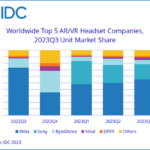As more enterprises start looking critically at ROI, expect some of the AI fervor to cool – and interest in immersive spaces for the enterprise to take off.
With so many technology trends to follow, it’s really difficult to pinpoint the most important things to watch for in 2024. Being the time of year for experts to weigh in on these things, there’s a temptation to be bold, but with things changing so quickly, it’s hard to predict much of anything more than a few months out.
I’m more inclined to focus on broader trends to keep an eye on, where I know interesting things are happening. I can’t tell you what specifically will happen, but given how I see the stars lining up, I will say why a particular trend should be on your 2024 watch list, and here are two of them.
AI Backlash Coming
This may seem to counter the unstoppable momentum AI built up over 2023; it’s having more than a moment, and why spoil the party? AI may be a party for some, but it’s showing parallels to Silicon Valley excess that we’ve seen before, and often doesn’t end well.
To be fair, AI feels like a form of salvation for our digital world that nothing before it has offered, so we should be welcoming it. A darker take on AI’s increasing ubiquity be a sense of inevitability, and even resignation, that we will all succumb to its powers, thus ushering in the singularity, i.e. the hypothetical point int the future where technological development becomes uncontrollable (by humans) and irreversible (again, by humans).
While this has the makings for an Arthur C. Clarke sci-fi epic, I’d like to think that the machines haven’t won yet, and at least some portion of humanity will push back and take pause on AI in 2024. The Sam Altman/OpenAI saga helped bring some key issues to a head, especially around responsible AI, striking a balance between innovation and regulation, and market concentration that gives big tech a bad name.
While AI seems certain to remain in the domain of big tech, the rapid pace of development – and adoption – is creating major FOMO for business leaders, and they will not likely change course in 2024. What ChatGPT did to accelerate AI in 2023, Google Gemini will likely do the same for 2024.
However, with above concerns not going away, I can see some course corrections coming. The risks connected to the malicious uses of AI are very real, but there are also more practical realities to consider. AI has come onstream so fast that businesses simply cannot adopt it fast enough to realize meaningful benefits. Vendors are figuring out how to monetize AI, and businesses are trying to find the ROI.
These things will balance out in time, but at the moment, IT teams lack AI-native expertise, trust for using AI is shaky, and the costs are only going to rise. While there seem to be plenty of successes with AI, we don’t hear so much about the failed experiments, and based on our casual experiences – especially as consumers – there must be many of those. We’re all learning the AI-verse as we go, but I believe some reality will set in during 2024, and the vendors will encounter some pushback for the first time. Maybe not a lot, but some pause will be healthy, and ultimately build a stronger foundation for what will inevitably come.
Immersive Spaces for Business Become a Thing
The worlds of AR/VR/MR and metaverse continue to expand for consumers, and that alone is good reason to keep tabs on where things might go in the workplace for 2024. One of my main mantras – “consumers lead, and enterprises follow” – applies here, as a lot of workplace tech adoption happens only once consumers have embraced it.
Like AI, this is a market that will be driven by big tech, and when they deem it’s time to make a push, it’s time for us to pay attention. 2024 is looking like that time, at least based on what three of those big tech players have been doing recently. First consider Apple and their Vision Pro mixed reality (MR) headset. The $3,500 price point is an obstacle for some consumers but it ultimately won’t dampen interest; nobody drives consumer tech adoption like Apple, and even if modestly successful, Apple’s user experience will help seed the enterprise market in due course.
It’s easy to overlook Apple in this equation as they’re just bringing a headset to market – there’s no enterprise collaboration platform here – but Vision Pro ups the stakes for other big tech headset players, some of whom are very much invested in enterprise collaboration. Also worth noting – today’s gamers are tomorrow’s developers (if not already) – and when the vendors start investing in building immersive enterprise workspaces, these developers will be in high demand.
The more direct players to watch are, of course, Microsoft and Meta. Just as Microsoft came out of the pandemic as the dominant collaboration player with Teams, they seem poised to do it again in this space via their recently-launched Mesh for Teams. While they can compete with Apple with HoloLens for headsets, it’s the combination of their Mesh platform and Teams that covers the bases for immersive collaboration better than anyone else.
Mesh started out as a standalone, developer-centric platform driven by Azure – translation – great for geeks, but not the broader enterprise – but nowit’s playing a supporting role within Teams. Rather than being the consumer gateway to AR/VR, here Mesh serves to enhance the Teams experience, including the entire Microsoft business ecosystem.
After years of working on HoloLens, Microsoft knows that headsets are far too clunky and costly to make immersive collaboration accessible to enterprise users en masse, So rather than wait for endpoints to evolve, Microsoft offers two flavors; 2D without headsets and 3D with headsets. For those who can afford to indulge in 3D, great – but at this early stage of driving adoption, 2D is a much easier onramp to this new way of working.
By the way, this new way of working is more than looking at legless avatars sitting around a virtual table, or delighting in spatial audio to hear every conversation in the virtual room. With Windows now able to run in a VR environment, workers are no longer tethered to their PCs – they can do their work right from the headset. That’s not going to drive the market in 2024, but it could be a game-changer once immersive collaboration gets its legs – literally and figuratively if you’re paying attention here. There’s already a trend story about remote-meeting platforms that permit users to meet while walking; what will be possible once there’s a headset?
For those of you saying you’ve seen this movie before, you’d be right – Second Life and Avaya’s web.alive come to mind right away. They were simply ten years too early, and if they had today’s AI back then, they would have owned this market.
Finally, where Microsoft goes, Meta won’t be far behind. They launched Meta Quest for Business in November, and have been integrated with Microsoft for Office, with Windows integration coming. The relationship between these companies is messy, but Meta sees the enterprise as a growth market, and while they have the headsets, they need Microsoft as a platform partner.
Regardless of how that plays out, the thread for me is that Microsoft, Meta and Apple provide plenty of big tech momentum to at minimum, get immersive collaboration on the map for 2024. I’m not saying we’ll see mainstream adoption, but it’s feeling like a thing now, more so than ever before. For a while, I’ve been saying with immersive spaces being native to the digital generation, the workplace use cases will not be such a big leap now that the right tools and platforms are here – as in for 2024.
In passing, it’s also worth noting that one of the big collaboration players – Zoom – sees a market here as well, but is playing things much safer via their Welo app (called Visual Breakouts). While a far cry from what the big tech FAANG-level players are going for, they have their eye on immersive collaboration as well, and given their innovation prowess, don’t be surprised to see Zoom make some noise here in 2024 too.
Quelle:
Foto: metamorworks – stock.adobe.com
https://www.nojitter.com/ai-speech-technologies/brace-ai-backlash-and-embrace-virtual-spaces-2024


